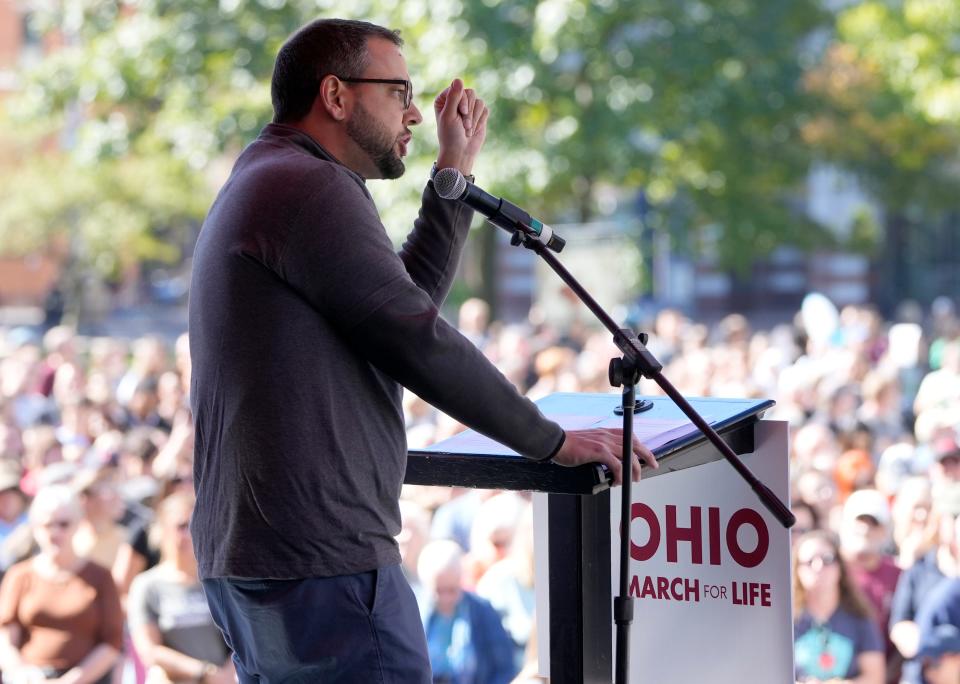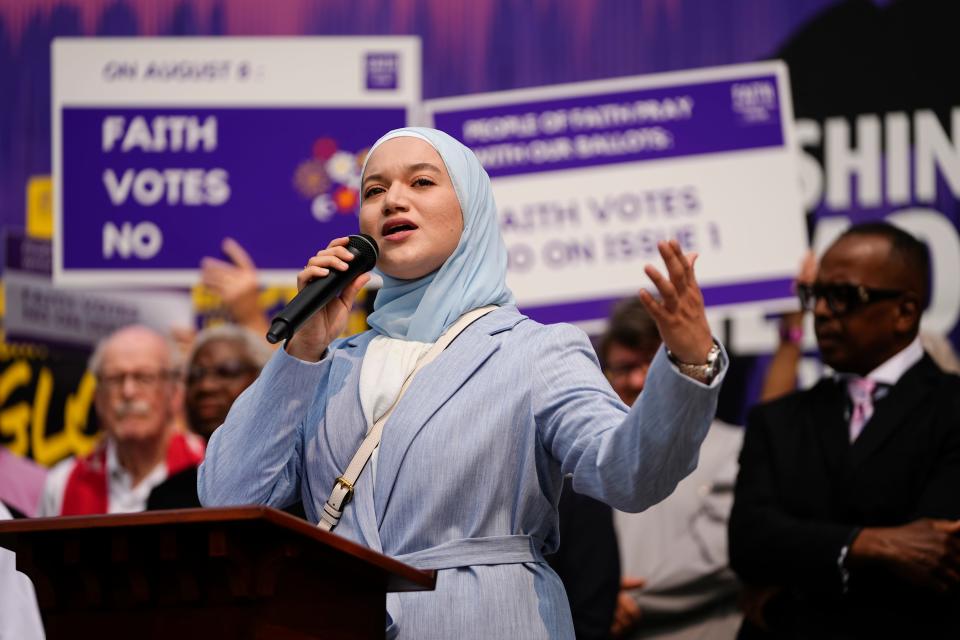For some religious groups, Issue 1 is about abortion. For others, it’s democracy at stake
To Rev. Jeffrey Kee, Ohio Issue 1, the Aug. 8 ballot measure that would make it more difficult to change the state constitution, represents a threat to democracy.
“My parents migrated from Birmingham, Alabama, and one of the things that motivated them (to move to Ohio) was to have a greater sense of equity,” Kee, who heads the predominantly Black New Faith Baptist Church on Columbus’ Near East Side, told The Dispatch. “When it comes to Issue 1, to say that 40% can rule over the majority and to take away from each vote … is unjust, it's unfair, it’s ungodly and it’s undemocratic.”
Issue 1 would require a 60% majority of voters to pass a constitutional amendment and require petitioners to collect signatures from at least 5% of voters in every county, among other stipulations.
But faith leaders on the other side of the debate see the Aug. 8 vote as important for another reason: abortion.
“Christians must defend life. That’s why Issue 1 is so important to us,” Jeremy Westbrook, the executive director and treasurer of the State Convention of Baptists in Ohio, part of the Southern Baptist Convention, told The Dispatch.
If Issue 1 passes, it would make it more difficult to pass a Nov. 7 ballot measure that would enshrine abortion rights in the state constitution.
“If we endorse or enshrine abortion, that removes the most foundational right that any of us can have, and that's the right to life,” said Westbrook.

Recent weeks have seen a burst of advocacy by religious groups on both sides of Ohio Issue 1. Unlike elections involving political candidates, churches and faith leaders are generally able to lobby for positions on ballot-based elections without jeopardizing their nonprofit legal status.
“It’s important to emphasize the fact that you have religious communities speaking out and advocating on all sides of this issue,” said Isaac Weiner, an associate professor and director of the Center for the Study of Religion at Ohio State University.
The Ohio Christian Alliance, an Akron-based nonprofit voter education organization, designed a flier for distribution at the pews calling on the faithful to “Vote Yes on Issue 1 on August 8th... to safeguard Ohio’s Constitution and Ohio’s pro-life laws that were passed through the legislature.”
The Center for Christian Virtue, a Columbus-based nonprofit, posted an online video that also frames Issue 1 in terms of the abortion debate.
In it, a narrator claims November’s abortion amendment would “legalize abortion up until birth” and “allow a minor to get an abortion without her parents’ knowledge or consent.”
In fact, the proposed amendment text states that “abortion may be prohibited after fetal viability” except in cases where the mother’s life or health are at risk. Law professors interviewed by the USA TODAY Network Ohio Bureau say it's highly unlikely that the proposed amendment would eliminate parental consent in Ohio.

Some churches in the Catholic Diocese of Columbus have also encouraged their parishioners to vote ‘yes’ on Issue 1 − a move that has received permission from Bishop Earl Fernandes.
“Let us pray that we can have the courage to vote yes on Issue 1…to help eliminate this attempt by special-interest groups to take away the rights of our parents, to take away the rights of the unborn. These are precious rights that were given to us by God, and they cannot be taken away by a mere majority,” Deacon Christopher Walsh said during services at St. Matthew Church in Gahanna on July 23.
On the other side of the debate, several dozen clergy from various faiths gathered for a “Faith Votes No” rally at Washington Gladden Social Justice Park in Downtown Columbus Wednesday.
Rabbi Hillel Skolnik of Congregation Tifereth Israel said at the event that he opposes Issue 1 on moral grounds because “every person should be represented equally.”
“If you try to allow for the tyranny of the minority…that is the opposite of the message of what Moses reminded the Israelites so many years ago: that, yes, we listen to God and yes, we follow the commandments, and yes, we also listen to the people equally,” Skolnik said.
Amina Burahmi, executive director for the Ohio chapter of the Council on American Islamic Relations, framed Issue 1 in terms of government overreach, which she said harms Muslims and other minorities.
The Ohio Council of Churches, which includes regional leaders of the United Methodist Church, the United Church of Christ, the Episcopal Church and others, has also issued a letter opposing Issue 1.
“It is clear to us that the resulting power imbalances will significantly damage many segments of Ohio’s population, particularly African American communities historically weakened by partisan gerrymandering,” reads part of the July 28 letter.

Weiner, from the Center for the Study of Religion, said there is a long history in the U.S. of religious leaders speaking out on political questions of “moral concern,” ranging from abortion to voting rights.
“It's not always clear-cut what communities define as being matters of moral concern,” he said. “And that itself can be contested for some communities.”
Peter Gill covers immigration, new American communities and religion for The Dispatch in partnership with Report for America. You can support work like his with a tax-deductible donation to Report for America at:bit.ly/3fNsGaZ.
pgill@dispatch.com
This article originally appeared on The Columbus Dispatch: Ohio faith leaders divided on Issue 1 constitutional changes

